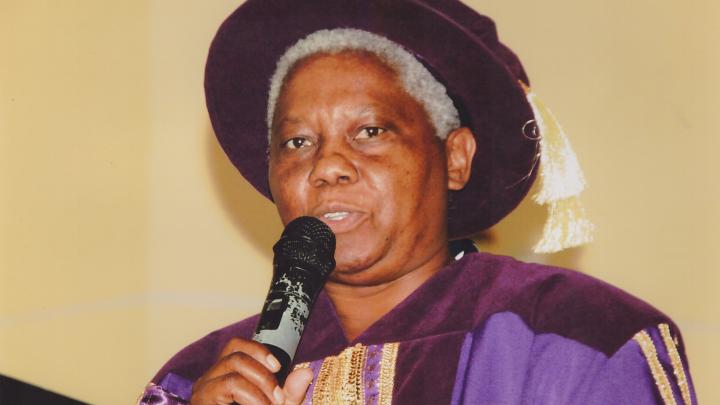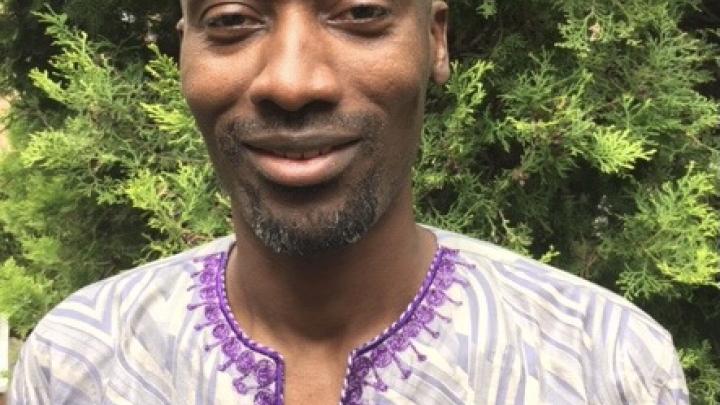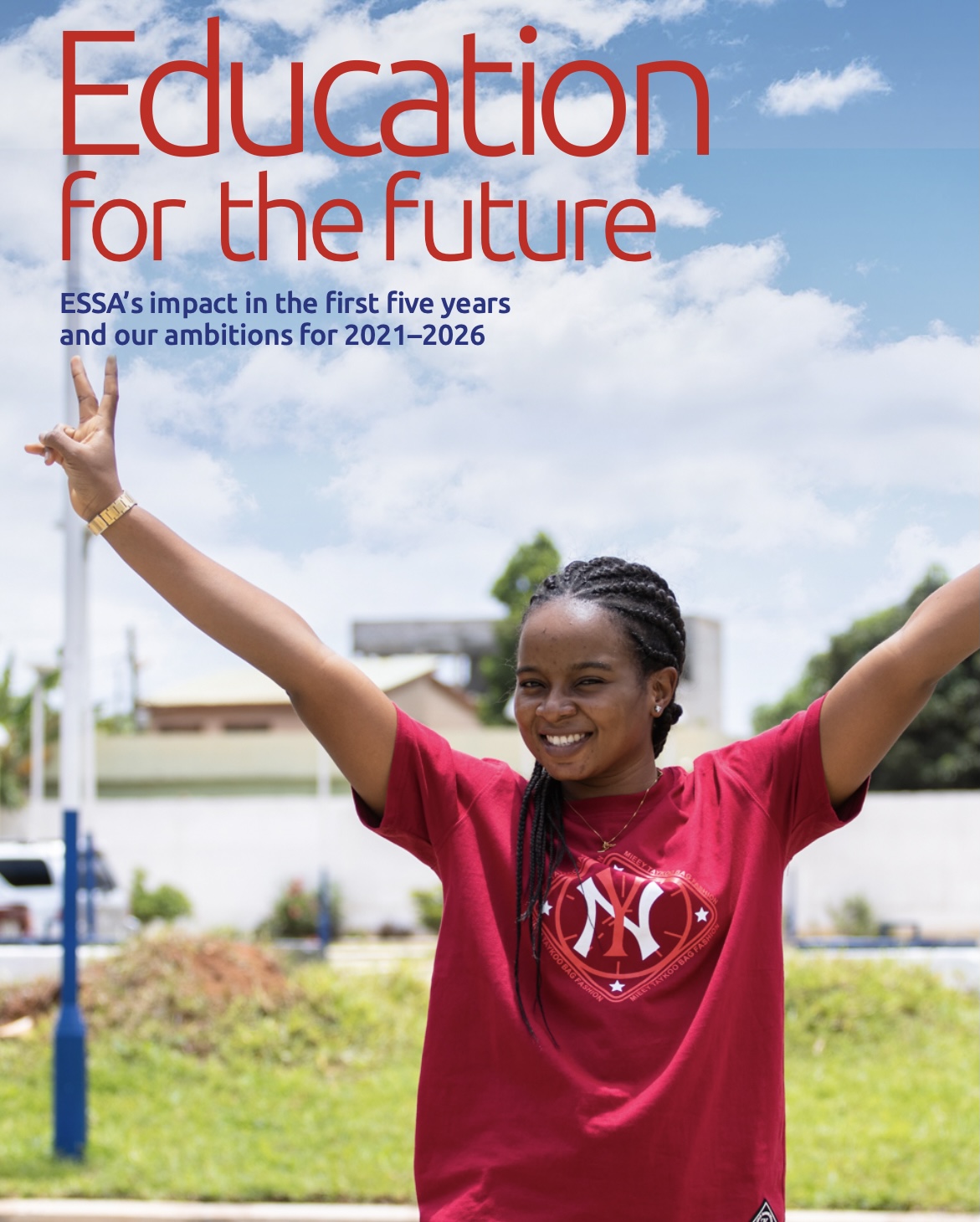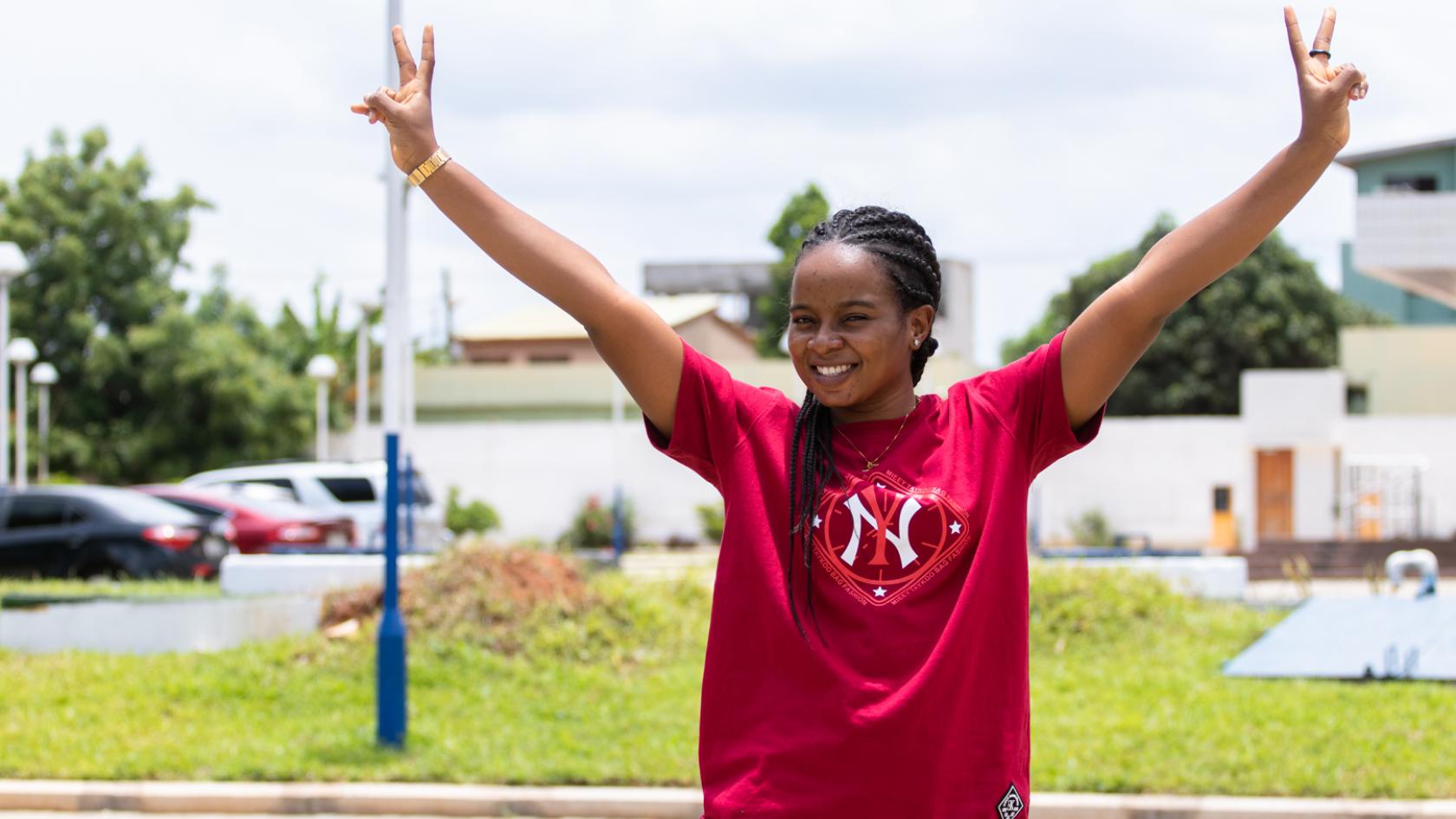
Bienvenue
Nous sommes fiers de présenter le premier rapport d’impact de l’ESSA. donnant un aperçu de notre contribution à la transformation de l'enseignement supérieur en Afrique subsaharienne.-
Nous avons pris des mesures importantes pour résoudre les problèmes clés, grâce au calibre et à l'engagement de nos partenaires et bailleurs de fonds.
Une éducation et un travail de qualité guideront l’avenir de l’Afrique subsaharienne
D'ici 2050, la jeune population africaine augmentera de près de 50% et 450 millions de travailleurs devraient intégrer la population active au cours de la prochaine décennie. L’accès à une éducation de qualité et à des possibilités d’emploi pertinentes sera essentiel pour déterminer si la plus grande population de jeunes au monde devient une occasion extraordinaire de sortir des millions de personnes de la pauvreté ou une crise majeure pour la région et le monde.
Focus sur l'enseignement supérieur et son lien avec le marché du travail
Le rôle des collèges, des universités et des formations professionnelles joue un rôle important dans le renforcement des compétences et des connaissances des jeunes pour le monde du travail.
Nos trois principaux domaines d'intervention abordent des questions complexes pour un changement à long terme:
-
La recherche sur l'éducation par des chercheurs en Afrique subsaharienne utilisée pour changer la politique et améliorer l'éducation
-
Le manque d'universitaires et de personnel dans l'enseignement supérieur et
-
L'efficacité et accessibilité des bourses pour les jeunes.
Notre contribution: s'associer, informer et inspirer pour augmenter son impact
Nous inspirons ceux qui travaillent dans le domaine de l'éducation et ceux qui ont les ressources pour l'améliorer, à travailler ensemble. Plus que jamais, les décisions doivent être prises sur la base de preuves qui peuvent être étendues pour améliorer le plus de vies.
J'espère que vous vous êtes inspiré jusqu'à présent de notre travail. Si vous souhaitez partager vos idées, vos compétences ou votre partenariat de manière plus formelle avec nous, veuillez nous contacter.
Olaf Hahn, directeur général, ESSA
Patrick Dunne, président, ESSA
-
-
I know the importance of scholarships in helping more young people access universities and colleges
We are living in extraordinary times and as the pandemic has changed major parts of our lives. This generation of young people are sometimes labelled as not having the leadership skills to be at the centre of decision-making.
However, recent times have proven we can do anything. I am so proud of the hard work of young people in Africa in responding to pandemic and other huge challenges we are facing like unemployment. From becoming creative entrepreneurs in Ghana to working as frontline workers fighting the pandemic in Zimbabwe, we have been resilient. This can also be attributed to the education, trainings, mentorship and opportunities provided by institutions and individuals to build our leadership skills. One of such organizations is Education Sub Saharan Africa and I have had the opportunity to intern with them.
I got to know about ESSA in May of 2017 when my university notified students of a summer internship opportunity working on a research project for ESSA. My application was successful, and I began my two-month internship in July as part of the team that mapped university scholarship programmes in sub-Saharan Africa. This led to later creating and launching a website called the African Scholarships Hub where students can find the right scholarships for them. I enjoyed working on the project as I found out about different scholarship programmes available for African students to pursue higher education. While I was in Zimbabwe, I only knew of a handful of these programmes, and I realized that many students may miss out on opportunities simply because they do not know that these programmes exist. As an August Wilhelm von Hofmann scholarship recipient, I know the importance of scholarships in helping more young people access universities and colleges.
My internship led on to working as a Research and Programmes Intern for ESSA since October 2017. Since then, I have had insight into the challenges facing university and college education in sub-Saharan Africa such as quality, accessibility, inclusiveness and equality, as well as the numerous efforts by various parties to solve these issues.
As ESSA celebrates its 5th anniversary this year, I reflect on my contributions as a young person in this organization and how we can all support a charity that works with and for young people. The end goal is to ensure that young people in sub-Saharan Africa have opportunities and resources to help achieve our ambitions.
Lisa Tichagwa
Intern, ESSA
“L'ESSA s'est considérablement développée au cours des trois dernières années. Le financement de démarrage que nous fournissons offre un retour sur investissement élevé. Je suis ravi de voir l'ESSA se développer davantage et de produire un impact élevé pour l'enseignement supérieur en Afrique subsaharienne.”
Joachim Rogall, président-directeur général, Robert Bosch Stiftung
Histoires
Le professeur Goski Alabi, maître de conférences et universitaire à l'Université des études professionnelles du Ghana, Sepiso Dean Mwamelo, stagiaire à l'ESSA, travaillant sur l'inclusion sociale dans les bourses et Samuel K. Boafo, directeur des ressources humaines (RH) à Cal Bank, Accra, Ghana, racontez leurs histoires sur l'inclusion sociale et le système d'enseignement supérieur en Afrique subsaharienne.
“Nous aimons l'idée que l'ESSA soit née de l'enseignement des apprenants et de la formation des enseignants dans des écoles comme la nôtre. L'idée que quelque chose d'aussi audacieux a été déclenché et façonné par nos opinions et celles des apprenants est inspirante.”
Magdalene Mtwele, Mafiga Teacher School, Tanzanie
Notre Impact
Nous appliquons une approche rentable avec une petite équipe dirigée travaillant à distance dans le monde entier. Depuis le démarrage, nous avons travaillé avec 33 étudiants de toute l'Afrique subsaharienne qui ont participé à notre programme de stages rémunérés.Au cours de nos trois premières années, nous avons travaillé sur trois domaines de travail complexes pour prouver notre modèle.
-
1.Nous avons rendu plus accessibles les recherches essentielles sur l'éducation menées par des universitaires en Afrique subsaharienne.
Il existe une multitude de recherches sur l'éducation par des chercheurs en Afrique subsaharienne. Mais ces recherches ne sont souvent pas suffisamment utilisées aux niveaux national, régional ou mondial pour résoudre les problèmes de l'éducation.
Notre contribution à la résolution de ce problème:
-
Notre première étape a été de réunir des chercheurs d’Afrique subsaharienne avec des chercheurs du monde entier, notamment en soutenant l’Association ivoirienne des chercheurs en éducation pour cartographier la recherche en éducation en Côte d’Ivoire et s’assurer qu’elle est utilisée dans le monde entier.
-
Aux côtés du centre d'accès et d'apprentissage équitables (REAL) de l'Université de Cambridge, nous avons créé la base de données de recherche sur l'éducation en Afrique (AERD).
-
Ces preuves peuvent être utilisées pour changer les politiques et résoudre les défis de l'éducation. La base de données met en évidence les lacunes de la recherche en éducation. Ceci est particulièrement crucial pour les domaines sous-recherchés identifiés dans la base de données (tels que l'éducation aux conflits).
Nos prochaines étapes pour atteindre un impact plus large:
-
Ce travail a mis au jour des domaines clés pour l'investissement dans la recherche, tels que la nécessité d'une communauté de recherche plus inclusive avec l'égalité des sexes au cœur.
-
Nous continuons à soutenir le réseau de chercheurs pour inspirer le changement de politique dans l'enseignement supérieur à travers l'Afrique subsaharienne.
-
-
2. Nous avons pu calculer précisément le manque de professeurs dans les collèges et universités du Ghana, en développant une méthodologie qui peut être utilisée ailleurs en Afrique.
Les collèges et universités d'Afrique subsaharienne n'ont pas suffisamment de personnel pour répondre à la demande croissante d’éducation. En conséquence, de nombreux jeunes en Afrique subsaharienne n'obtiendront pas une éducation de qualité qui leur permettrait d’acquérir des compétences pour le monde du travail.
Notre contribution à la résolution de ce problème:
-
Notre première étape a été de rassembler des preuves sur le corps professoral actuel en examinant des politiques telles que le ratio élèves-enseignant, le sexe du corps professoral et le domaine d'enseignement. Nous avons d'abord travaillé avec le Ghana parce que les taux d'inscription dans les universités et les collèges du pays augmentent rapidement.
-
Pour ce faire, nous avons rejoint un réseau de partenaires experts composé de l'Association africaine des universités (AUA), du Conseil national ghanéen pour l'enseignement supérieur, du Population Reference Bureau (PRB, une institution de recherche de premier plan sur la démographie), et avec le soutien de la Fondation Mastercard. Ensemble, nous avons réalisé une étude pilote, la «Démographie des professeurs», qui a analysé les données de 213 universités et collèges du pays.
-
L'étude a informé le gouvernement ghanéen et les établissements d'enseignement d'une analyse détaillée de la situation actuelle de leur corps professoral.
-
Ajouter ce texte au graphique: le Ghana a besoin de cinq fois le nombre actuel de personnel universitaire public pour répondre à un nombre croissant d'étudiants
Nos prochaines étapes pour atteindre un impact plus large:
-
Nous étendons notre travail à d'autres pays d'Afrique subsaharienne pour mettre en évidence les défis, renforcer les établissements d'enseignement et accroître les investissements dans l'enseignement supérieur.
-
Nous développons des outils pour les collèges, les universités et les organisations afin de planifier l'allocation des ressources pour l'inscription des étudiants.Nous continuerons de travailler avec nos partenaires pour utiliser initialement ces outils au Ghana, puis nous adapter à d'autres pays d'Afrique subsaharienne.
-
-
3. Nous avons cartographié l'efficacité et l'accessibilité des bourses pour les jeunes en Afrique subsaharienne
Alors que la demande d’éducation augmente dans le plus jeune continent du monde, les bourses d’étudiants augmentent également. Pourtant, il existe peu de preuves pour savoir si les bourses aident les jeunes à rejoindre le marché du travail et peu de suivi du retour sur investissement du financement.
Notre contribution à la résolution de ce problème:
-
Nous avons réalisé un travail de premier plan en associant des universités, des étudiants et plus de 350 prestataires qui offrent des bourses à des jeunes en Afrique subsaharienne pour apprendre les meilleures pratiques.
Les principaux défis que nous avons trouvés étaient:
-
Accessibilité des bourses pour les plus marginalisés
-
Un manque de suivi de l'impact des bourses sur la société au sens large
-
Faible taux d'achèvement
-
Engagement entre les boursiers, les universités et les étudiants
-
Relier les diplômés des bourses à un travail décent.
-
Sur la base de ces défis, nous avons développé un ensemble d'indicateurs de performance clés (KPI) pour l'inclusion sociale dans les programmes de bourses, fournissant des conseils aux prestataires et aux bailleurs de fonds.
Nos prochaines étapes pour atteindre un impact plus large:
-
Ce travail a directement alimenté le rapport de l'UNESCO sur le suivi mondial de l'éducation 2020 (GEM) sur l'éducation et l'inclusion, lancé en avril 2020. Nos conclusions seront partagées publiquement dans ce rapport à la section 4.b.
-
Notre objectif est de continuer à rejoindre une communauté d'experts avec une vision commune pour augmenter la qualité et l'impact des bourses pour les étudiants d'Afrique subsaharienne.
-
De plus, nous lançons une plate-forme Web associant des étudiants d'Afrique subsaharienne à des possibilités de bourses.
-
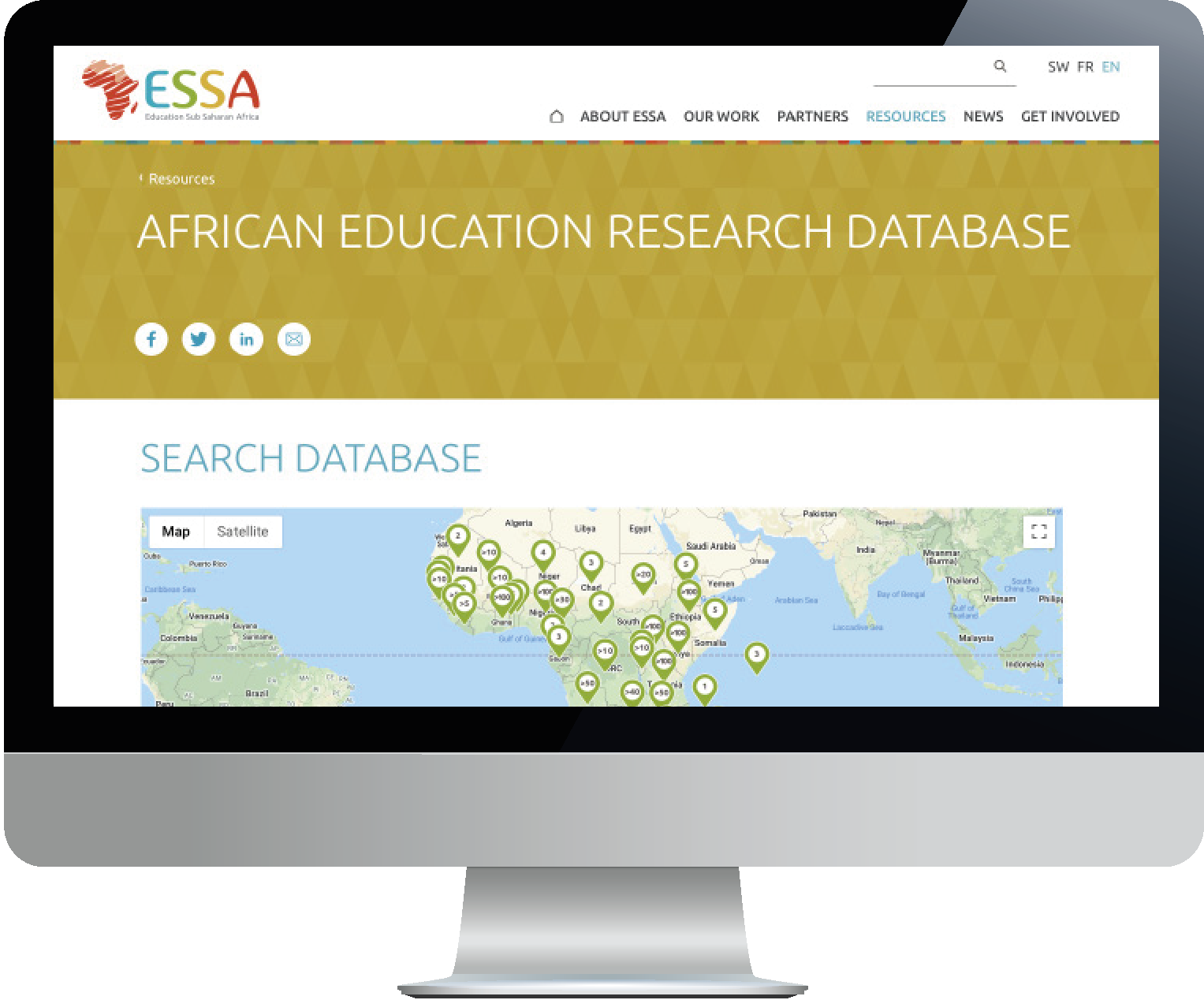
la base de données de recherche sur l'éducation en Afrique (AERD).
Aux côtés du centre d'accès et d'apprentissage équitables (REAL) de l'Université de Cambridge, nous avons créé la base de données de recherche sur l'éducation en Afrique (AERD).
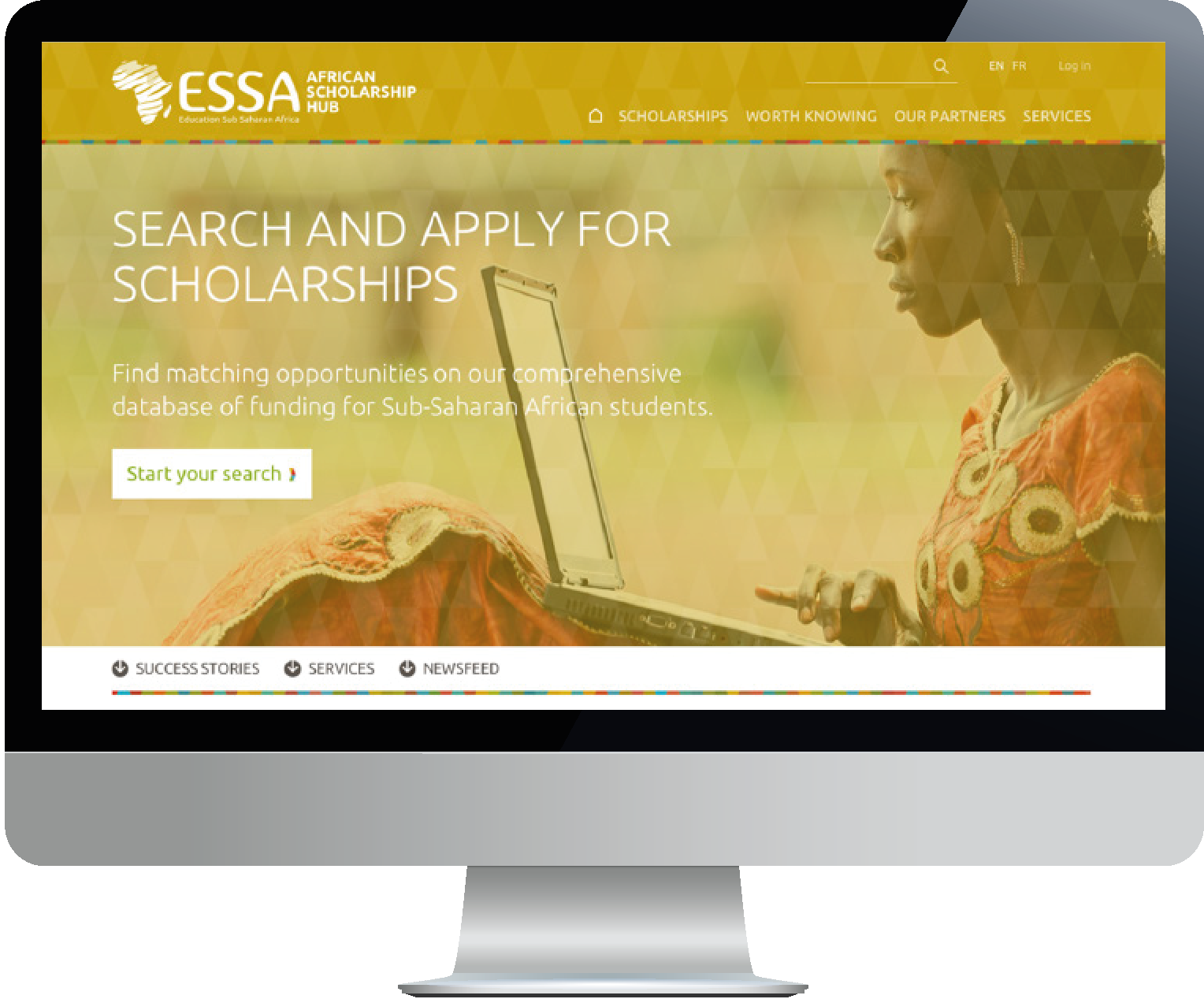
Pôle de bourses Africaines
Nous lançons une plate-forme web associant des étudiants d'Afrique subsaharienne à des possibilités de bourses.
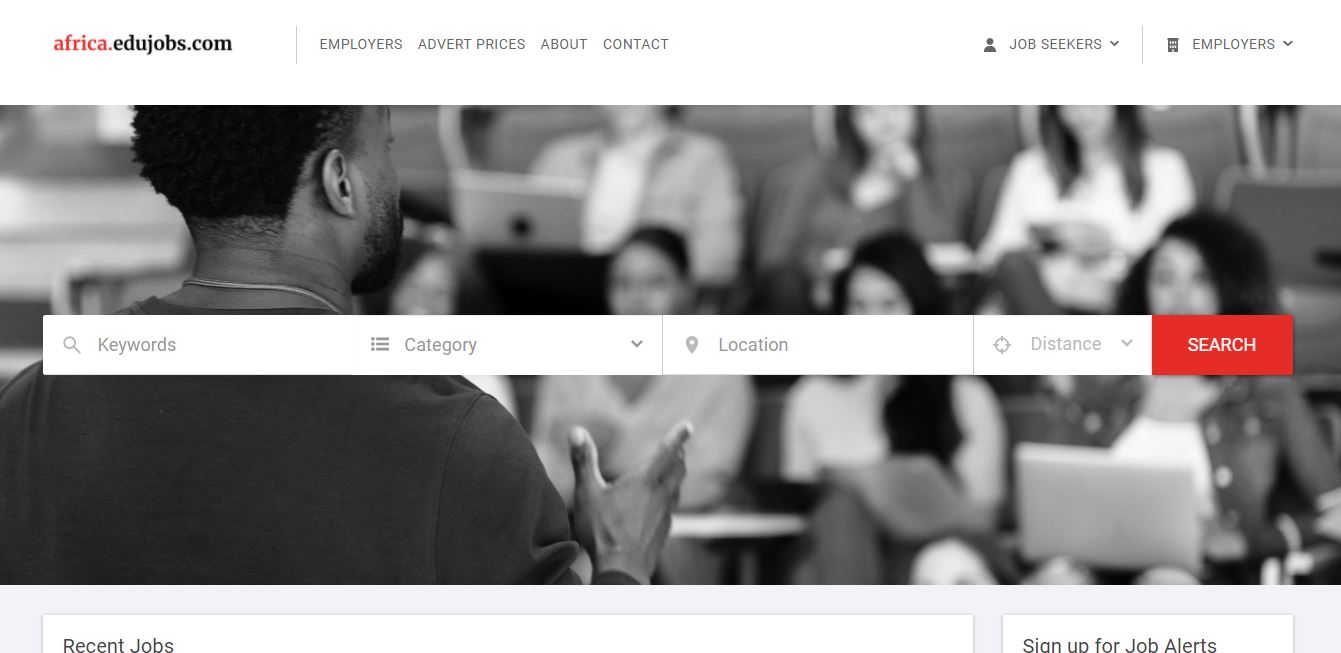
Edujobs Africa
The African Jobs Board was created by the Association of African Universities (AAU), the Warwick Employment Group (WEG) in partnership with ESSA.
The jobs site promotes opportunities between universities, colleges and other education institutions across the sub-Saharan region, and helps job seekers find new opportunities in education.
-
Graph Legend
-
Enseignants pour remplacer ceux qui quittent le système : Besoin d’enseignants pour remplacer ceux qui quittent leur poste (en supposant que 5% des professeurs et 10% du personnel enseignant quittent chaque année académique).
-
Croissance annuelle des inscriptions : Besoin d’enseignants pour répondre à la croissance des inscriptions d'étudiants (en supposant une augmentation annuelle constante de 5%).
-
Titulaires d'emplois non vérifiés, improductifs et assurant plusieurs postes en même temps : Besoin d’enseignants pour remplacer ceux qui existent nominalement sur la liste des salariés des universités mais qui n’existent pas (‘fantômes’), ceux qui ne sont pas productifs (‘zombies’) et ceux qui occupent plusieurs emplois d'enseignement / de recherche à la fois (‘moonlighters’) (ce qui signifie que le nombre d’enseignants est actuellement surestimés de 5%).
-
Enseignants par discipline : Besoin d’enseignants pour correspondre aux prescriptions politiques sur la répartition des étudiants dans toutes les disciplines (60% des étudiants en sciences et 40% en sciences humaines/sociales) et pour correspondre aux prescriptions politiques quant au nombre d’étudiants par enseignant.
-
Nombre d’étudiants par-enseignant : Besoin d’enseignants pour correspondre aux prescriptions politiques (18 : 1 en sciences, 27 : 1 en sciences humaines/sociales).
-
Égalité entre les sexes : Besoin d’enseignants pour établir une distribution égale entre hommes et femmes enseignants (en supposant que les projections du besoin d’enseignants pour 2025 maintiendront la distribution actuelle et qu'une augmentation supplémentaire au niveau du recrutement de femmes est nécessaire pour atteindre la parité).
-
Learning in Crisis
-
Our COVID-19 Response
How we responded as a team
Back in March 2020 when the global pandemic hit, the ESSA team was already working remotely. We adapted quickly, putting in place measures that ensured the safety of our employees and stakeholders. This enabled us to maintain our support to those at the forefront of education in sub-Saharan Africa.
Adapting did not come without challenges. Most notably the strain placed on many of our partners and the tertiary education sector in sub-Saharan Africa.
Despite these challenges, our partners and those we work with – including students, educators and policy leaders – came together to protect education as a fundamental right for all during this crisis.
How the education sector responded: learning in crisis report
The COVID-19 pandemic has challenged universities and colleges in sub-Saharan Africa in many new and unexpected ways. It is becoming increasingly clear that COVID-19 will be a fixture in our lives for some time to come.
Our Learning in Crisis report addressed some of these challenges and learnings from the pandemic response for the tertiary education sector.
Fionah Umulisa, former ESSA intern and Africa Leadership University graduate, Rwanda:
“Students are being left behind with e-learning, for example the Ministry of Education have put resources on their website, on the radio, and on television, but many students don’t have electricity or can’t afford data. Teachers and students with internet access also need training to use these e-learning platforms.”
We identified top lessons for college and university students, faculty, and Vice Chancellors in sub-Saharan Africa. Infographics needed with top lessons for:
Through promoting the report on our social media platforms, we gained over 9,000 views. Through sharing the report directly with our partners and their member organizations, we reached over 5,000 education stakeholders.
The results of our report aim to improve education policymakers’ and researchers understanding of the current challenges. Most importantly, it will serve as an important tool for recovery strategies for students, vice chancellors and faculty members during and after the pandemic.
Our work from evidence to action
-
Access to university and college
Scholarships Impact
We are supporting more young people to attend university or college and complete their course. We are maximising the return on investment of scholarships, loans and grants by building the evidence base and working with funders.
-
Identify issue: Young people are concerned about the high cost of education (Quilt.AI 2021). As demand for education surges in the world’s youngest continent, there is limited evidence to know whether scholarships are helping young people to join the workforce and little tracking of the funding return on investment.
-
Building an Evidence Alliance: Bringing together students, universities, and influential scholarship funders and providers. Scholarship funders and providers see the potential for collaboration and agree on the core challenges to achieving impact for young people.
-
Understand evidence: Pioneered analysis into over 400 top scholarship programmes for students in sub-Saharan Africa. Uncovered low return on $750 million annual investment, limited access for disadvantaged students, high drop-out rates, limited support for students to find jobs, lack of tracking about impact of scholarships on society.
-
Solution: Analysis featured in UNESCO’s 2020 Global Education Monitoring (GEM) report. Using this knowledge, we created the ‘African Scholarships Hub’ to help young people find scholarships more easily online. Created a mini report on the inclusion of young people living with a disability in Technical and Vocational Education Training (TVET).
-
Solution at scale: Created publicly available KPI framework for social inclusion within scholarship programming, providing guidance to providers and funders. Expanding digital hub to thousands of scholarships. Partnership established with UNHCR to map pathways into education for refugees in West and Central Africa.
“The in-depth analysis of scholarship opportunities for sub-Saharan African students, contributed by ESSA to our Report, filled a void in research that needed to be filled. Charged with a mandate to monitor the fourth Sustainable Development Goal, SDG 4, but with no systematic data on the number of scholarships mentioned in Target 4.b, this analysis was a critical piece for us. It successfully reinforced the message that scholarships must prioritize an inclusive focus if they are to be equitable.”
- Global Education Monitoring Report, UNESCO
-
-
Quality of university and college education
The Faculty Crisis
Africa is facing a shortage of academic teaching and research staff. At the same time, more young people are enrolling in university or college across the region. COVID-19 is making delivering quality education even more difficult. To address this, we are connecting evidence on delivering quality education with university and college leaders, and policymakers.
-
Identify issue: Critical shortage of academic teaching and research staff.
-
Building an Evidence Alliance: Created a consortium – made up of the Association of African Universities (AAU), Education Sub Saharan Africa (ESSA), and the Population Reference Bureau (PRB) – in partnership with the Ghana National Council of Tertiary Education (NCTE), now the Ghana Tertiary Education Commission (GTEC), commissioned a study called the Demographics of Faculty to understand the quantity and quality of faculty members and policy environment of universities in Ghana.
-
Understand evidence: The study revealed that Ghana is facing a critical shortage of academic teaching staff. To achieve the desired student-teacher ratios, public universities in Ghana are required to hire an additional 3,410 faculty staff of which 71% would need to be women. Gender inequality persists across faculties within disciplines and academic ranks. In the 2016/2017 academic year, only 10 out of 120 faculty staff with the rank of professor at public universities were women. In 2019 we led research on the impact of COVID-19 on university and college education in sub-Saharan Africa (as seen on page X).
-
Solution: Updating the GTEC university and polytechnic policy norms. Creating digital tools to improve data collection and faculty planning across Ghana.
-
Launched first academic African jobs board ‘Edujobs’ to help faculty and education job seekers find jobs and employers in the education sector find talent, in partnership with University of Warwick and the Association of African Universities.
-
Solution at scale: Continue to work with partners, and the Inter-University Council of East Africa, expanding work to 6 countries in East Africa. Establishing a methodology for developing an online planning tool that can be replicated and used to improve faculty planning and decision-making in other African countries.
“The ESSA's study found that Ghana needs five times more faculty to meet growing numbers of students. The results were timely and revealing. It made those of us in academia and policy making rethink the approach to solving the faculty deficit challenge. The local/ national capacity for producing doctoral graduates in universities in Ghana is inadequate. The practices and competencies of focus for faculty also need to be enhanced to include teaching and learning skills, research skills, grant management skills and other soft skills, which are not currently part of the requirement for becoming an academic in Ghana.
Taking part in ESSA's workshop on the faculty crisis revealed to me in a most practical way, the skills and competences that effective academics should possess and the opportunities to develop more faculty with global perspectives in an international academic environment. Thanks to ESSA for that revealing initiative. I hope to see the impact of the study and workshop positively affecting faculty development in Ghana.”
- Prof. Goski Alabi, Co-founder of Laweh University College in Accra, Ghana, and participant in our Demographics of Faculty study.
“There is the need to reduce the gap that exists between the student-teacher ratio. We need more faculty staff and academics to ensure that the teaching is effective and the learning processes are efficient within the university communities.
It is important for teaching and students, it is important for research, it is also important for community service because if there is a deficit, usually African researchers come out with poor teaching strategies, poor research outputs, and they may have limited time for community services because they are overly burdened.”
- Fred Awaah, Lecturer at the University of Professional Studies, Accra, Ghana
Women Leading
Women must have more leadership opportunities and roles to improve society for us all. Whilst this is not unique to education, academia can set the bar. We have an opportunity to unlock the potential of female leadership.
Universities and colleges are places where women can gain leadership skills and roles:
-
Female role models in universities and colleges can inspire new generations of young people to be leaders.
-
Mentoring and networks within universities and colleges and beyond can unlock the power of female leadership.
-
Scholarships can develop students and educators into leaders.
This counteracts unconscious gender biases: transforming society so that it works better for everyone.
-
Identify issue: underrepresentation of women in leadership positions within universities and colleges (and beyond). Only 8% of professors at public universities in Ghana are women (ESSA DAF study). Across sub-Saharan Africa just 2.5% of vice-chancellors are women. More evidence is needed on the role of universities and colleges in equipping women for accessing leadership opportunities and positions in sub-Saharan Africa.
-
Building an Evidence Alliance: Bringing together universities, colleges, employers, and leadership organisations. Promoting female education leaders' stories.
-
Understand evidence: Analyzing female leadership policies and practices within universities and colleges. Led a survey and interviews to discover the barriers female students, faculty and graduates in sub-Saharan Africa face accessing leadership skills and roles.
-
Solution: Released a report on the State of Female Leadership in Education in Sub-Saharan Africa.
-
Solution at scale: Scoping solutions for policies and improved leadership programmes.
“At some point, society, family, circles pull you down and you don’t know how to get up. Where I think ESSA can come in is to really integrate leadership as part of education."
Almaz Negash, Founder of the African Diaspora Network.
-
-
Transition to work
Universities increasing work skills for young people
We are joining up employers with universities and colleges to work on evidence-based approaches to help young people transition into jobs.
-
Identify issue: In Ghana, it takes more than ten years for most graduates to secure decent jobs after leaving school. (ISSER of the University of Ghana, 2017). In Uganda 79.5% of employed young people are undereducated for the job they are doing (ILO SWTS, 2014). There is a miss-match between what students are learning in university and the skills employers need. This is underpinned by a lack of data and evidence about what students do once they leave university or college.
-
Building an Evidence Alliance: Joining up employers, universities and colleges across region. Established a partnership with The Education Collaborative at Ashesi University in Ghana. Engaging employers with universities and colleges e.g The University of Cape Coast, Ghana (UCC).
-
Understand evidence: Identified the barriers for increasing employability and closing the skills gap for young people between university/college and employment. Created mini-report on how universities in Africa can build job skills for young people.
-
Solution: Using evidence to develop a framework for effective career services in universities/colleges and tracking young people’s employment.
-
Solution at scale: Testing the framework with UCC and co-creating activities to share learning with other universities and colleges.
-
-
Knowledge eco-system
The African Education Research Database
We contribute to a sustainable knowledge ecosystem for education by raising the profile of African education researchers and increasing access to relevant data.
-
Identify issue: There is a wealth of research on education by researchers in sub-Saharan Africa. But this research is often not sufficiently used nationally, regionally or globally to solve challenges in education.
-
Building an Evidence Alliance: We partnered with African researchers and the Research for Equitable Access and Learning (REAL) Centre at the University of Cambridge.
-
Understand evidence: Together we created the first free online database of education research by scholars in Africa, with over 3500 papers in English, French and Portuguese. African Education Research Database(AERD)
-
Solution: Gaps in research and the need for a research community were identified. Curating research from AERD, promoting improved education, including a report on access to TVET for people with disability.
-
Solution at scale: Supporting a network of researchers to inspire policy change in tertiary education in the region. Curating research from this database to promote better education policies, making it more accessible to policy/decision-makers for tertiary education in Africa. The database highlights gaps in education research. This is particularly crucial for under-researched areas identified in the database (such as education in conflict and TVET).
"Often the claim is that education is under-researched in Africa and there is not enough information available. While this in not completely untrue, the reality is that there is a lot of research and information out there that only needs to be unearthed and made visible.
This is where the database comes in and so far, has done a very good job at increasing visibility of education research and scholars in Africa. The platform also has an impactful role in our daily work, as we are always looking for education research to learn form and improve our work."
- Maud Seghers, Senior Education Advisor at VVOB
Unlocking Education Data
We are mapping available data sets across education covering early childhood education, primary and secondary and into tertiary. We have started to build a community of practice to increase the access and use of this data.
-
Identify issue: Data about post-secondary education is hard to find and use. It is difficult for decision-makers – from governments to university leaders, and researchers – to access and find the data they need to improve education delivery and policy.
-
Building an Evidence Alliance: We are working in partnership with Zizi Afrique and the EdTech Hub to create a community of researchers and organisations who gather education data. This community will map existing education data and find out where there are gaps, and influence those who own data to share it widely.
-
Understand evidence: The data community has begun mapping available education data in Kenya. We are bringing in evidence from our African Education Research database and connecting with African scholars across the continent who need data for their work.
-
Solution: Replicate data mapping in Ghana and other countries in sub-Saharan Africa. Develop online and offline tools for the community of practice to share data and learn from each other.
-
Solution at scale: Holding a series of workshops with researchers and policy makers to find out what data they need and why.
“The biggest gap is the use of evidence to connect trainers and employers to transform the way young people in sub-Saharan Africa access employment opportunities post-training.”
- John Mugo, Executive Director, Zizi Afrique Foundation
Listening to students
Applying to colleges and for jobs is a daunting process for students. From gathering information to navigating long forms - students seek close guidance and support. The internet has opened up a world of possibilities and support for students, especially those looking to go abroad for university, college, or work.
As of 2017, there are 9 million post-secondary students in sub-Saharan Africa. As educational attainment grows, so too will the qualified numbers of young people in Africa seeking a university or college education abroad and at home.
We worked with Quilt.AI to understand students’ journeys online in Ghana, Kenya, Zambia and Uganda. We wanted to answer the following questions - what are the enablers and barriers to post-secondary education, scholarships, and job applications? What are students saying about these areas?
Up to 300,000 unique searches by students on social media were analysed across the four countries. We also looked at 2,000 social media posts from Facebook, Twitter and Instagram to understand how students are getting information about university and jobs and what conversations they are having.
The pandemic has affected students’ lives, from attending college to finding jobs in struggling economies. As they navigate future uncertainties, organizations, like ESSA, play a critical role in helping them navigate opportunities. The internet is a powerful platform to reach students as they use it to find information and resources. Using digital insights and marketing tools can amplify organisations’ messages and reach more students.
-
Transformational impact through partnerships
-
Transformational impact through partnerships
Partnerships have always been essential to ESSA’s success. We seek to work with partners across the African continent on all our projects. Our small team magnifies impact through those we work with. ESSA is one part of the ecosystem of individuals and institutions seeking to transform tertiary education in sub-Saharan Africa and our greatest successes have come from brokering partnerships within this ecosystem to deliver change.
How we do it:
-
Identifying organisations with the right expertise in Africa and beyond.
-
Bringing new ideas and using our experience of delivering practical and relevant research, to bring these organisations together to form networks and communities.
-
Working with these networks and communities to understand what data and evidence is needed for change, and to build robust and credible knowledge.
-
Working together to use knowledge to create practical solutions. Building influence within specific communities.
-
Achieving a mandate to drive change at scale from memberships or electorates. Networks and communities implement solutions at scale.
-
Developing an evidence alliance for education that delivers impact for young people in sub-Saharan Africa.
Spotlight on: Association of African Universities & Warwick Employment Agency
The Association of African Universities (AAU) is a longstanding leader in African tertiary education. Its mission is to enhance the quality and relevance of university and college education in Africa and strengthen its contribution to Africa’s development.
Warwick Employment Group (WEG) provides worldwide employment opportunities for students, institutions and their staff, to maximise their potential in the workplace. The organisation is developed through a quality, ethical, community approach, mirroring the aspirations of our university partners, to fulfill a recruitment need for the higher education sector.
In partnership with the Association of African Universities (AAU) and the Warwick Employment Group (WEG); part of the University of Warwick, we launched Edujobs Africa, the first academic jobs board for the continent. Edujobs Africa is an online website, hosting job vacancies in tertiary education in Africa; this includes academic and staff roles at universities, colleges, and other education organsiations across Africa. The site will support universities, colleges and governments in the region to retain academic talent within Africa, promote mobility between educational institutions across Africa and help job seekers in Africa to find new opportunities in education.
Edujobs Africa offers the opportunity for universities, colleges, and other education institutions to promote their work and vacancies to a broad audience.
-
L'ANNÉE À VENIR
Nous envisageons une année 2020 passionnante.
En plus de s'appuyer sur nos domaines de travail actuels, nous avons reçu un soutien important de Dubai Cares pour développer deux nouveaux domaines prioritaires en 2020: le leadership dans l'éducation en mettant l'accent sur le leadership féminin, et l'impact de l'engagement des entreprises et des stages pour les jeunes.
Nous avons appris que pour créer un véritable changement, nous allons mettre davantage l'accent sur la création de réseaux et l'établissement de liens solides avec les décideurs. Nous établirons également une approche de suivi et d'évaluation pour l'organisation.
Pour ce faire, nous allons renforcer les capacités au sein de l'organisation et par le biais de nouveaux partenariats. Si vous souhaitez nous aider, contactez-nous.
How we aim to reach this goal through our focus areas
-
Access to university and college education
Impact of scholarships in the next year:
-
Research conducted to understand the growing need for student finance, the funding and different models available, their cost-effectiveness, and impact. Evidence is provided to decision-makers.
-
Expand mapping to TVET opportunities and other forms of student finance, including grants and loans, in our focus countries.
-
Engage with corporate sponsors of scholarships.
-
Understand the barriers to access to education for refugees through our work with UNHCR, and women through our Women Leading work, ,and the role that student finance can play in improving their access to education.
In the next five years, by 2026:
-
A core group scholarship funders and providers have signed up to common KPIs to drive improved return on investment and impact for young people.
-
Our African Scholarships Hub is reaching students across sub-Saharan Africa, including those from under-represented groups, and helping them find the right scholarships for them.
-
There is a community of interest for student finance that shares good practice and data on results, and advocates for further investment.
-
Providers of student finance design their programmes to be inclusive of women, refugees and other under-represented groups.
-
Young people in our focus countries have the data and evidence to seek the financial aid that is right for them.
-
Policy-makers in our focus countries have the data and evidence to design and implement effective financial packages.
-
Investors have the data and evidence to invest in approaches that achieve the most impact, particularly for the young people in our focus countries.
-
-
Quality of university and college education
The faculty crisis, in the next year:
-
Our analysis of the faculty crisis in East Africa is underway, incorporating the impact of COVID-19.
-
There is a deeper understanding of the impact of the faculty crisis on quality university and college education in our focus countries.
-
Current solutions to the faculty crisis in our focus countries and the evidence for their impact are well understood.
-
Policy-makers and leaders of universities and colleges in Ghana have the tools to quantify the scale of the faculty crisis they are facing.
-
Edujobs Africa, a pan-African jobs board, is successfully improving the speed and quality of faculty recruitment.
In the next five years, by 2026:
-
New models for universities and colleges are mapped with a focus on 1) models targeted explicitly at employment and 2) models with a large component of online learning.
-
Analysis of the faculty crisis is expanded to cover TVET institutions.
-
Assessment of the faculty crisis becomes standard across SSA.
-
Data on the faculty crisis are readily available.
-
Policy-makers in our focus countries have effective strategies in place to address the faculty crisis.
-
The potential for new models of tertiary education to deliver quality at scale are well understood.
-
The faculty crisis and potential solutions are well understood across Ghana, East Africa and other regions.
Women Leading, in the next year:
-
There is uptake of our Women Leading report findings by organisations in our network.
-
There is a coalition for action to overcome the barriers female leaders face within universities and colleges.
-
Establish and mobilise strong partnerships in one (or more) focus countries to deliver impact.
In the next five years, by 2026:
-
The effectiveness of scholarships, mentorship, network, training and policies to increase female leadership is understood in our four focus countries.
-
New models for increasing female leadership skills and positions universities and colleges are mapped in our focus countries.
-
Policy makers, employers and educators are making use of data to determine what measures must be taken, what targets must be put in place, and what policies are needed to improve the numbers of women in leadership positions.
-
There are specific leadership development programmes and policies aimed at building the leadership capacities of women.
-
-
Transition to work
Increasing work skills, in the next year:
-
In Ghana there is a deeper understanding of the barriers for employers engaging with universities and colleges.
-
Evidence for what is effective within universities and colleges for improving transition to employment in our focus countries is mapped and translated into guidance (including internships, apprenticeships and alumni networks).
-
The characteristics of effective careers development systems and measurement frameworks are well understood.
-
Barriers and solutions for women and other under-represented groups transitioning into employment and leadership positions are well understood.
In the next 5 years, by 2026:
-
Universities, colleges and employers are effectively collaborating to improve employment prospects in our focus countries.
-
Tracking of students into work is widespread in our focus countries and data is openly available.
-
Universities, colleges and employers in our focus countries are implementing 'best practices' for supporting women and other under-represented groups and tracking their success.
-
Young people and their parents in our focus countries can use data (e.g. on employment after graduation) to make choices about what they study.
-
-
Knowledge eco-system
African-led research and unlocking data in the next year:
-
We continue to support researchers in Africa to be better networked, access more contracts for their work, and influence local policy.
-
We are hosting a virtual conference in 2021 in collaboration with the REAL Centre at the University of Cambridge, to bring together researchers from across Africa to discuss challenges they face related to research funding and opportunities.
-
Data and evidence on education in sub-Saharan Africa is more easily available for research and analysis and there is greater awareness of what exists, particularly policy-makers in our focus countries.
In the next five years, by 2026:
-
African researchers influence local policy in our focus countries.
-
Policy-makers and educators have access to relevant data on university and college education and the transition to employment for young people in our focus countries.
-
An overview of available data and evidence allows for smart investment in data collection and evaluation in our focus countries.
-
Relevant data and evidence are easy to find and are translated into practical guidance for educators, policy-makers and students in our focus countries.
-
The local ecosystem of data-collectors, academics, consultants and civil society has the access to the right data, evidence and skills to influence key decision-makers in our focus countries.
-
"Nous pensons que cette toute première intervention dans l'enseignement supérieur par Dubai Cares aidera à connecter les étudiants et les diplômés aux opportunités d'emploi et sera essentielle au développement d'économies et de sociétés prospères et durables. Ce programme, en partenariat avec l'ESSA, offre une opportunité passionnante pour Dubai Cares de jouer un rôle international de premier plan en contribuant à la réussite scolaire de millions d'étudiants, en stimulant l'emploi à long terme et en aidant à atteindre les objectifs de développement durable en Afrique. "
HE Dr. Tariq Al Gurg, Chief Executive Officer from Dubai Cares.
Les femmes dans le leadership - La vie en tant que professeure
Le professeur Goski Alabi est professeur au Laweh Open University College d'Accra, au Ghana.
MERCI
Nous remercions nos partenaires, bailleurs de fonds et donateurs privés pour leur soutien continu.
